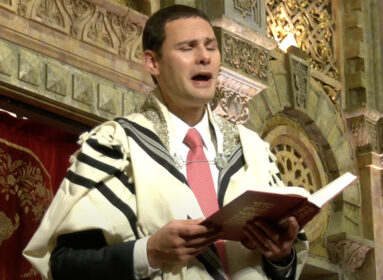
Israeli soldiers carry the coffin of Netanel Yahalomi during his funeral in the Israeli city of Modiin. Credit: Yonatan Sindel/Flash90.
Hundreds of mourners gathered at a synagogue in the small Orthodox community of Nof Ayalon in central Israel on Sunday, Sept. 23 for the funeral of IDF soldier Netanel Yahalomi. Yahalomi, 20, was killed by terrorists in the Sinai Peninsula near the Israel-Egypt border on Friday afternoon. He was laid to rest in the military cemetery in Modiin.
The three terrorists came to the border between Egypt and Israel south of Mount Sagi — an area in which the defensive fence being built by Israel is not yet complete. An IDF spokesperson told Yedioth Ahronoth that the IDF returned fire, killing all three heavily-armed terrorists, thus thwarting “a major terror attack that was supposed to take place in Israeli territory.”
“The terrorists were carrying a powerful explosive device,” he said. Reportedly, Yahalomi killed a terrorist before he himself was fatally shot.
It is not clear if the terrorists were from Gaza or from the Sinai Global Jihad Organization Another IDF soldier was injured in the attack.
Yahalomi, the third of six children born to Shmuel and Tova Yahalomi, was in a hesder program, which combines army service with yeshiva study. He was nicknamed by his army buddies as “Halachic Man” – the title of a well-known book by Rabbi Joseph B. Soloveitchik that describes Soloveitchik’s view of how the ideal religious Jew thinks and acts.
“It was very important to him to integrate Torah study into everything he did,” said his sister Avital. “Even when he came home, it was important to him to learn Torah. He was a man of truth.”
His mother, Tova, said she had spoken to him just the day before he died.
“He was home two weeks ago, and was supposed to come again only on Sukkot. He was supposed to be in the army for Yom Kippur,” said Avital. “We sent him the package because we wanted him to have a good holiday. He was very sorry he wouldn’t be able to pray with a minyan on Rosh Hashanah, but told us he was excited because they managed to blow the shofar.”
Avital said he rarely spoke to his family of the dangers of serving on the Egyptian border.
“He never agreed to tell us exactly what he did in the army,” she said. “He said he was forbidden to tell us anything.”








 Southern New England Jewish Ledger
Southern New England Jewish Ledger









